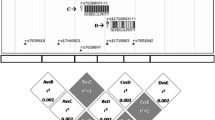Abstract
Variants in the SMAD family member 3 (SMAD3) have recently been reported to be associated with osteoarthritis (OA) in European populations. However, the results are contestable. To assess the role of such variants in SMAD3 in OA susceptibility in peripheral joints OA, we conducted a case–control study in a Northeast Chinese population. The SMAD3 SNP was genotyped in patients who had primary symptomatic OA with radiographic confirmation and clinical symptom and in controls, and the associations were examined. A total of 111 knee OA patients, 121 hand OA patients and 236 controls were genotyped. Statistically significant difference was detected in genotype and allele frequencies between OA and control groups in the population. There were significant association for knee OA OR = 3.68 (95 % CI 2.03–6.70; p < 0.001) and for hand OA OR = 3.60 (95 % CI 2.01, 6.44; p < 0.001). The association was also positive even after stratification by sex except for male population of knee OA. Our data indicated that genetic variation in the SMAD3 gene is involved in pathogenesis of both knee OA and hand OA in Northeast Chinese population, which is consistent with in European populations.


Similar content being viewed by others
References
Reginster JY (2002) The prevalence and burden of arthritis. Rheumatology (Oxford) 41(Supp 1):3–6
Sun BH, Wu CW, Kalunian KC (2007) New developments in osteoarthritis. Rheum Dis Clin North Am 33:135–148
Jensen CH, Rofail S (1999) Knee injury and obesity in patients undergoing total knee replacement: a retrospective study in 115 patients. J Orthop Sci 4:5–7
Schouten JS, de Bie RA, Swaen G (2002) An update on the relationship between occupational factors and osteoarthritis of the hip and knee. Curr Opin Rheumatol 14:89–92
Blagojevic M, Jinks C, Jeffery A, Jordan KP (2010) Risk factors for onset of osteoarthritis of the knee in older adults: a systematic review and meta-analysis. Osteoarthritis Cartilage 18(1):24–33
Grotle M, Hagen KB, Natvig B, Dahl FA, Kvien TK (2008) Obesity and osteoarthritis in knee, hip and/or hand: an epidemiological study in the general population with 10 years follow-up. BMC Musculoskelet Disord 9:132
Loughlin J (2005) The genetic epidemiology of human primary osteoarthritis: current status. Expert Rev Mol Med 7:1–12
Valdes AM, Loughlin J, Oene MV, Chapman K, Surdulescu GL, Doherty M et al (2007) Sex and ethnic differences in the association of ASPN, CALM1, COL2A1, COMP, and FRZB with genetic susceptibility to osteoarthritis of the knee. Arthritis Rheum 56(1):137–146
Neame RL, Muir K, Doherty S, Doherty M (2004) Genetic risk of knee osteoarthritis: a sibling study. Ann Rheum Dis 63(9):1022–1027
van der Kraan PM, Blaney Davidson EN, Blom A, van den Berg WB (2009) TGF-beta signaling in chondrocyte terminal differentiation and osteoarthritis: modulation and integration of signaling pathways through receptor-Smads. Osteoarthritis Cartilage 17(12):1539–1545
Yang X, Chen L, Xu X, Li C, Huang C, Deng CX (2001) TGF-beta/SMAD3 signals repress chondrocyte hypertrophic differentiation and are required for maintaining articular cartilage. Cell Biol 153(1):35–46
Li TF, Darowish M, Zuscik MJ, Chen D, Schwarz EM, Rosier RN et al (2006) SMAD3-deficient chondrocytes have enhanced BMP signaling and accelerated differentiation. J Bone Miner Res 21(1):14–16
Wu Q, Kim KO, Sampson ER, Chen D, Awad H, O’Brien T et al (2008) Induction of an osteoarthritis-like phenotype and degradation of phosphorylated SMAD3 by Smurf2 in transgenic mice. Arthritis Rheum 58(10):3132–3144
Yao JY, Wang Y, An J, Mao CM, Hou N, Lv YX et al (2003) Mutation analysis of the SMAD3 gene in human osteoarthritis. Eur J Hum Genet 11(9):714–717
Valdes AM, Spector TD, Tamm A, Kisand K, Doherty SA, Dennison EM et al (2010) Genetic variation in the SMAD3 gene is associated with hip and knee osteoarthritis. Arthritis Rheum 62(8):2347–2352
Van de Laar IM, van der Linde D, Oei EH, Bos PK, Bessems JH, Bierma-Zeinstra SM et al (2012) Phenotypic spectrum of the SMAD3-related aneurysms-osteoarthritis syndrome. J Med Genet 49(1):47–57
Loughlin J (2011) Genetics of osteoarthritis. Curr Opin Rheumatol 23(5):479–483
Acknowledgments
The study was supported by Department of Education of Heilongjiang Province (No. 12511280).
Conflict of interest
The authors declare that they have no conflicts of interest concerning this article.
Author information
Authors and Affiliations
Corresponding authors
Additional information
Liying Jiang and Yuchun Tao communicated equally to the paper.
Rights and permissions
About this article
Cite this article
Liying, J., Yuchun, T., Youcheng, W. et al. A SMAD3 gene polymorphism is related with osteoarthritis in a Northeast Chinese population. Rheumatol Int 33, 1763–1768 (2013). https://doi.org/10.1007/s00296-012-2593-z
Received:
Accepted:
Published:
Issue Date:
DOI: https://doi.org/10.1007/s00296-012-2593-z



